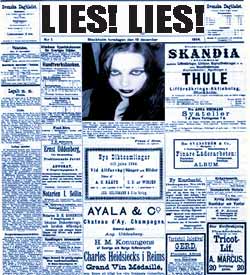Definition
of Libel
The definition of libel depends upon whom
is asked. It is clear that the definition of libel in U. S. law
revolves around defamation of character in the written form. One
definition of libel may not be enough to satisfy most, so we've
put together the top 10 definitions of libel from various legal
resources.
Definition of libel 1: Libel is the written
act of defamation, vs. slander, the oral act of defamation.
Definition of libel 2: use of print or pictures to harm someone's
reputation. Until 1964, a person could prove that they had been
libeled simply by showing that the statements in question were
incorrect. In 1964, the Supreme Court decided that public officials
had to prove that the statements in question were made with "actual
malice"-for the purpose of harming the person's reputation.
As a result of the Supreme Court case, Time, Inc. v. Firestone
(1976); private individuals only have to prove negligence, rather
than "actual malice," on the part of the press.
Definition of libel 3: Defamation of an individual or individuals
in a published work, with malice aforethought. In litigation,
the falsity of the libelous statements or representations, as
well the intention of malice, has to be proved for there to be
libel. In addition, financial damages to the parties so libeled
must be incurred as a result of the material in question for there
to be an assessment of the amount of damages to be awarded to
a claimant. This is contrasted to slander, which is defamation
through the spoken word.
Definition of libel 4: Libel per se describes statements, which
are widely understood to be harmful to a person's reputation.
For example, referring to an individual as an alcoholic or criminal,
or any description, which would lower the reputation of that individual
in the eyes of others. These words are harmful and libelous.
Definition of libel 5: A written, printed, or pictorial statement
that unjustly defames someone publicly. Prosecution of libel as
a punishable offense puts some measure of restriction on freedom
of the press under the First Amendment.
Definition of libel 6: To defame, or expose to public hatred,
contempt, or ridicule, by a writing, picture, sign, to lampoon.
A tort consisting of false and malicious publication printed for
the purpose of defaming a living person.
Definition of libel 7: To publish in print writing or pictures,
broadcast through radio, television or film something that is
false about someone else which would cause harm to that person
or his/her reputation by bringing the target into ridicule, hatred,
scorn, or contempt of others. Libel is defamation, which is written,
or broadcast and is distinguishable from slander, which is oral
defamation.
Definition of libel 8: A malicious publication expressed either
in print or in writing, or by pictures, effigies, or other signs,
tending to expose another to public hatred, contempt, or ridicule.
Such publication is indictable at common law.
Definition of libel 9: Published material meeting three conditions:
The material is defamatory either on its face or indirectly; The
defamatory statement is about someone who is identifiable to one
or more persons; and, The material must be distributed to someone
other than the offended party; i.e. published; distinguished from
slander.
Definition of libel 10: A publication without justification or
lawful excuse, which is calculated to injure the reputation of
another by exposing him to hatred, contempt or ridicule.
As one can see, the legal definition of libel revolves around
the maliciousness of the act and the harm it has causes. The act
of libel, according to the law, has to be in written or visual
form such as an article or photograph and has to somehow damage
the reputation of a person or business in some way where the courts
are the natural place to resolve the claims.
For example, if you were to write and publish an article accusing
someone without a criminal record or any other proof of being
a "disgusting pedophile" this statement would be very
libelous. The person's reputation would be damaged and you would
be open for a libel suit. If, however, you reported that you observed
someone with a past criminal record of inappropriate behavior
towards children, in a public place engaging children with candy
and games and wondered if this was legal, then this would be a
much safer statement.
In a libel case, the hardest part is trying to interpret the
intent of the defendant. If someone's intent was clearly malicious,
then a libel case has a good chance of succeeding. Libel is not
libel when it is about and un-definable group of people or organization.
Saying all "CEO's are crooks" is not libel, but specifically
naming a person who is a CEO, most likely is.
The best defense in any libel case is "truth" as this
element is thought to be something that mutual excludes libel.
The concept of "truth" is different from "fact"
so it is important to consult and attorney for the specifics.
See Defamation
of Character
See Slander
Laws
See Invasion
of Privacy
|


